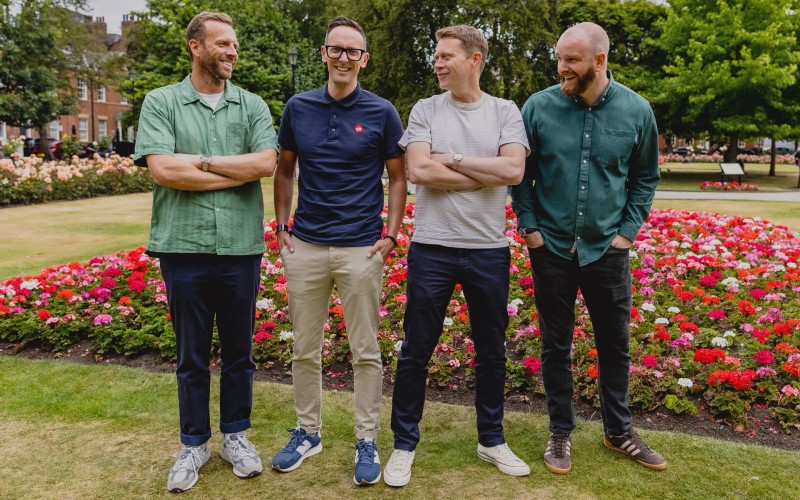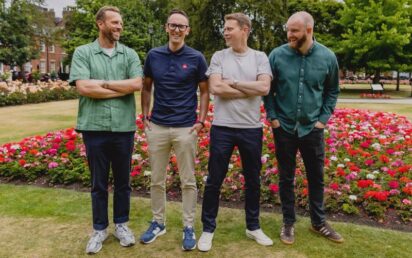Leeds startup HyperFinity is on a mission to become a global powerhouse in the world of decision intelligence.
The company uses the combination of data science and AI to help its clients to make better decisions about their customers and their products.
Since starting trading in 2019, HyperFinity has worked with a stellar line-up of retailers including Asda, Costa, Freemans, Able & Cole, George, Beaverbrooks and Studio Retail.
The company has grown turnover to a ‘significant seven figure sum’ and its workforce to 26 without receiving a penny in investment.
HyperFinity recently reached the final of the prestigious Snowflake Startup Challenge in the US, where startups from around the world showcased the creative possibilities for building groundbreaking applications to try and win the $1m top prize.
Identified by Tech Nation in 2021 as one of the UK’s Rising Stars, the company was founded by four data scientists – Adam Barrowcliff, Peter Denby, Damon Bryan and Thomas Hill – with a mission to make decision-making more personal.
Denby, who is also the chief commercial officer, said they offer software and consultancy to help retailers and brands compete and succeed.
Explaining the problem they’re trying to fix, he said: “We found that retailers were creating lots and lots of data, an absolute explosion of consumer data, but they were really struggling to create value from that data.
Tech Nation Rising Stars 3.0: Discova the next big things in UK tech
“What I mean by that was that they were struggling to analyse it, create insight, and then use that insight to make better commercial decisions.
“The data is only really valuable if you use that to improve the decision that you make with regard to your business.”
Denby said a global shortage of data scientists and AI talent was making it difficult for customers to utilise their data fully – which is where HyperFinity come in.
“A way of mitigating the shortage of data scientists would be to licence a technology platform, but from our experience the technology platforms we found were slow, expensive and difficult to use. That left retailers with a real challenge and lots of untapped value in their data.”
No coding skills
HyperFinity’s technology is easy to use because it doesn’t require coding skills.
“Our customers have seen an increase in their bottom line profit of five per cent based on the decisions that we help retailers make, which for a large retailer is a huge amount of money,” said Denby.
He added that retailers who can’t meet the needs of their customers will quickly be left behind.
“If the products the customer wants to buy aren’t on the shelf and the retailer can’t fulfil what they want, then the chances are they’ll go to a competitor and they won’t come back to you,” he said. “It’s vital to forecast demand really well so you’ve got products on the shelf, which is one of the areas that we help in.
“When your favourite type of tomato sauce is not available, it’s important that they recommend you the next closest alternative so that you still leave satisfied. We help with a type of analytics so we look at the similarity between different products.”
To date the business has been completely bootstrapped but that will have to change if they want to meet their growth ambitions.
“We were fortunate that we had a client within our first week of trading so that’s helped us. We’ve gone on to work with several high profile retail brands for three years and so we’ve been able to reinvest our profit from the business to grow our technology platform.
Investment
“Our vision is to create a world class, globally successful decision intelligence business. We’re bootstrapped so far, but we recognise that to achieve that we will need external capital and guidance and I’d imagine we’d look to go down the investment route over the next 12 months.”
Denby doesn’t want to compare HyperFinity with other businesses but an obvious one would be Manchester-based Peak, which raised £55m in Series C funding in 2021.
According to the co-founder the most successful retailers will be the on ones who offer the best customer experiences.
“The person that delivers the best customer experience is going to win and by great customer experiences we mean the customer has to perceive it as great value,” he said. “It has to be easy and convenient.
Customer experience is key
“If you look at how Amazon have worked, you know the value is pretty good. They’re not always the lowest price, but the value is clear. It’s really easy and really convenient, particularly if you take Amazon Prime.
“To achieve that you have to have a very deep understanding of what it is that your customers want and you make commercial decisions with customers at the centre so that you deliver the right product at the right price and market to them in relevant, timely ways. You also have to have products on the shelf when customers want to buy them.
“If you get those decisions right, you give yourself the best possible opportunity to win in retail. I think you’ll find more and more companies focusing on those fundamentals. And you have to use data really, really intelligently to achieve that.”


